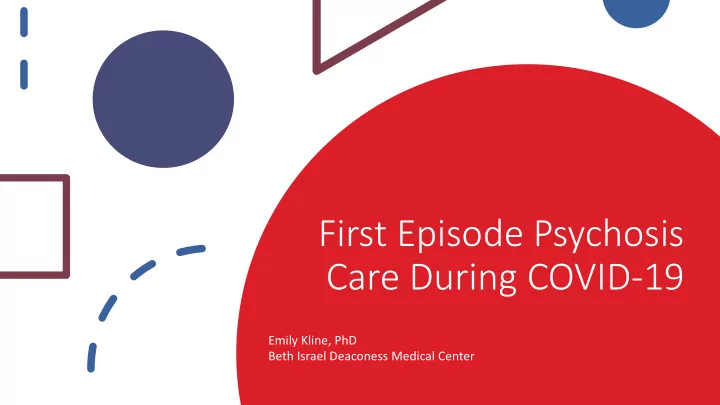

First Episode Psychosis Care During COVID-19 Emily Kline, PhD Beth Israel Deaconess Medical Center
Massachusetts Psychosis Network for Early Treatment
MAPNET Mission Create a community supporting early intervention in psychosis THROUGHOUT Massachusetts Promote evidence-based practices Facilitate early identification of psychotic disorders Encourage cross-program consultation Evaluate the effectiveness of FEP treatment in MA as well as our own effectiveness
FEP conferences Training and supervision on implementing Evidence Based Practices Webinars (e.g., identifying risk for psychosis, FEP services for MAPNET veterans, preventing metabolic syndrome, peer support) Activities Training and consultation on psychosis screening & assessment Fidelity evaluations Website: WWW.MAPNET.ONLINE
March 2020 • In mid-March, all non-emergency programming rapidly shuttered or transitioned to virtual-only • By coincidence, MAPNET held a virtual 90-minute learning meeting for FEP providers on Friday March 13 (originally planned as an all-day, in-person meeting) • We decided to keep the format
All-State FEP Community Calls (30-45 providers attend) Best practices for Supporting employment and engagement and privacy in education goals during Building your caseloads Race and racism in FEP clinical telehealth COVID-19 (…and being brave together…) care 3/13 3/27 4/10 4/24 5/8 5/22 6/26 7/24 How/what is everyone doing Understanding the transition Virtual care innovations & Self-care for mental health to FEP telehealth ideas providers
• Call participants surveyed about their experiences via zoom polls monthly • 4/24 meeting: 43 providers were How are FEP in attendance; responses offer a snapshot of what was happening, programs 1 month into the pandemic doing?
MA FEP clinics are using innovative strategies to continue to offer quality services during the COVID-19 crisis. Most programs are offering, or have plans to offer, new programing. 100% offering virtual care. Added new programs 80% satisfied with their clinic’s 6% transition to virtual care. No new programs 19% Services offered virtually: 52% Not yet but planning 0 20 40 60 80 100 23% to add Individual therapy Case management Not sure Family work/therapy Medication management 80% feel early intervention in Groups psychosis is as important as ever. Peer specialist support SEE * feel that there are clinic changes 87% New intakes made for COVID-19 that should be sustained in the future Diagnostic/neuropsych Emily E. Carol, Ph.D.
Virtual transition occurred quickly and clients are utilizing services. Date of 1st virtual session Overall fewer no-shows 0 10 20 30 40 50 Fewer no- pre March 2 shows 2-Mar More no-shows 22% 9-Mar 42% 16-Mar No change 23-Mar 26% not sure 10% 30-Mar 6-Apr of providers report an increase in session 61% frequency 36% encountered client concerns about privacy in virtual care Emily E. Carol, Ph.D.
Potential areas for added support and/or assessment: Risk Assessment Provider Burn Out 35 35 30 30 25 25 20 20 15 15 10 10 5 5 0 0 e 2 3 4 5 6 e e 2 3 4 5 6 e e e e e r r r r g g g g a A a A s - s I feel burned out - i 7 i 7 D D I feel comfortable assessing risk virtually - - 1 1 Emily E. Carol, Ph.D.
• On 5/22, 22 providers responded to these questions: COVID in FEP population “Have any clients in your FEP program tested positive for COVID-19”? 13 said YES, 4 said NO, 5 said NOT SURE “Have any clients in your FEP program died from COVID-19”? 1 said YES, 19 said NO, 2 said NOT SURE
• At least one FEP client died from COVID, but most programs have not observed this • All FEP programs rapidly transitioned to providing most or all services in virtual FEP care in format 2020: take • Many continued to accept new referrals • Virtual care has been great for some home points programs due to lower no-show rates and feasibility of briefer, more frequent check-ins • Virtual care has presented challenges and required creative solutions for programs oriented around milieu-based care
New challenges • Will reimbursement for virtual services stay at current rates? • Can programs sustain morale and inter-disciplinary collaboration? • Will a second wave of virus hit Massachusetts, perhaps impacting a younger demographic than the spring crisis? • How will youth manage ongoing disruptions to school schedules? • What will be the long-term mental health impacts of COVID-19 in COVID survivors, people with pre-existing mental illnesses, and the general populations???
WWW.MAPNET.ONLINE
Thank You!
Recommend
More recommend